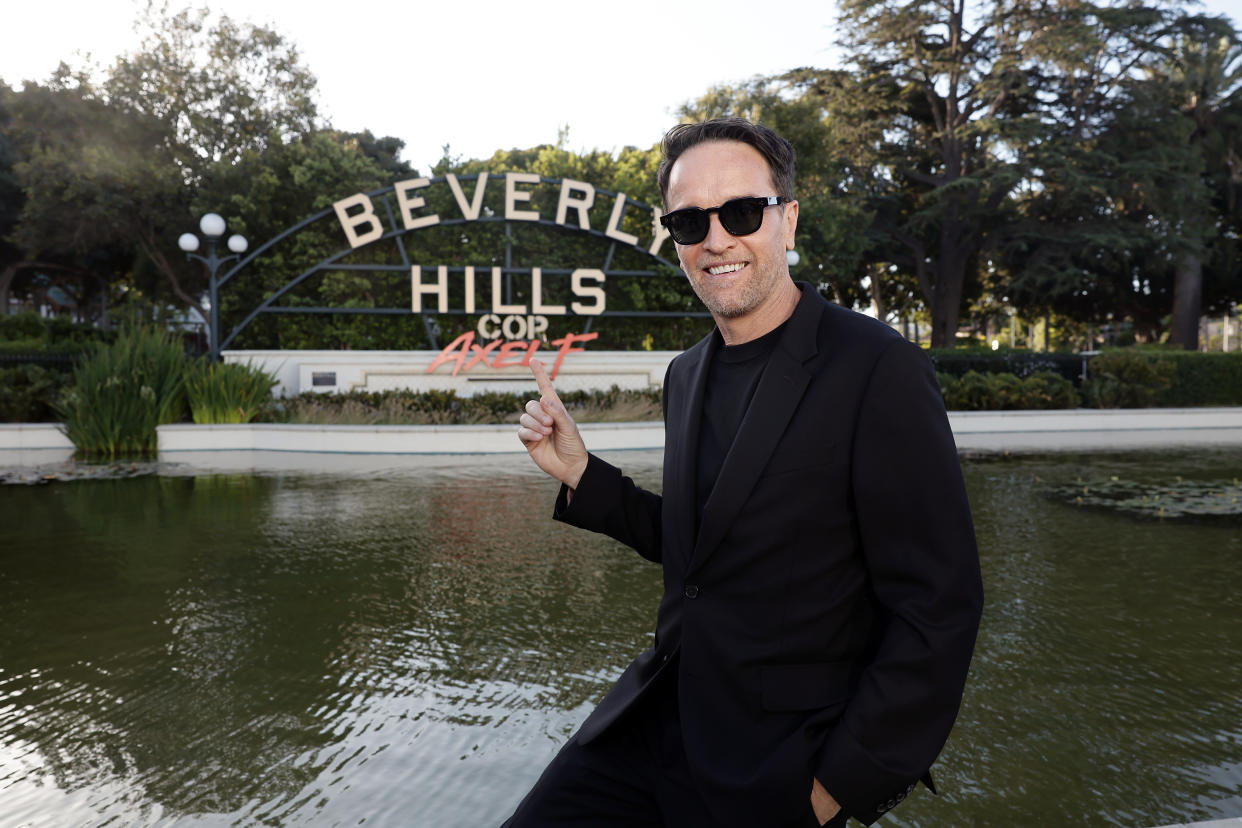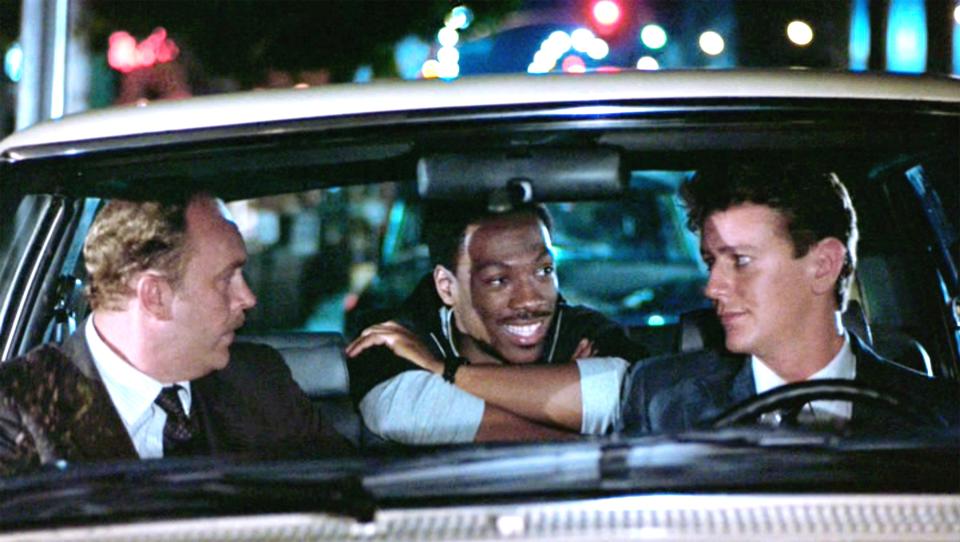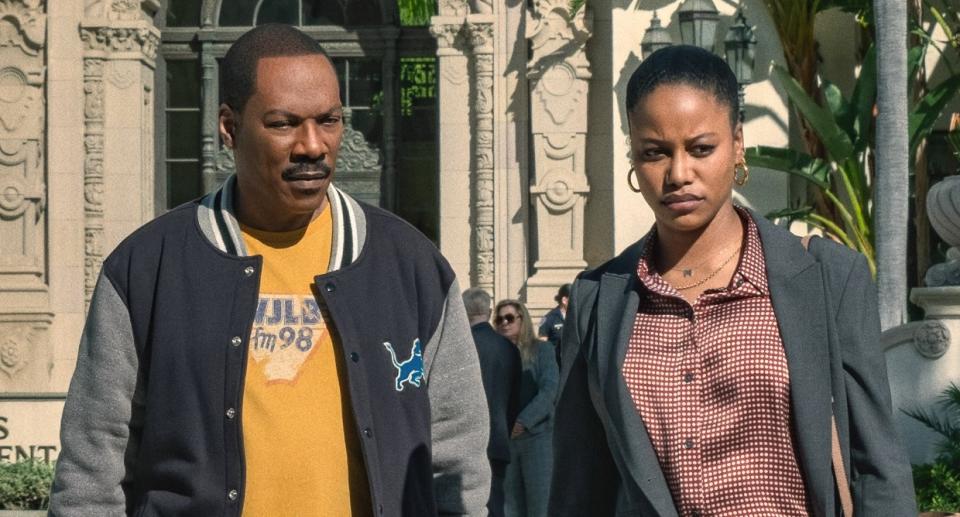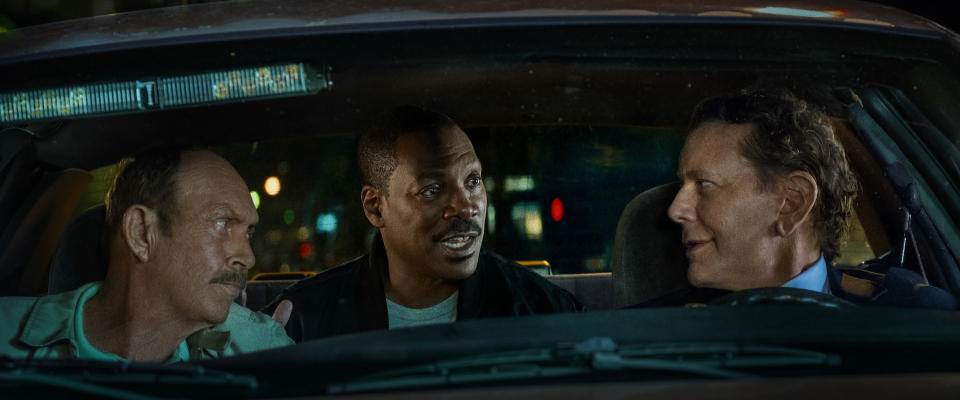The One Thing ‘Beverly Hills Cop: Axel F’ Director Mark Molloy Didn’t Do Before Taking on Much-Anticipated Fourth Film

When first-time feature filmmaker Mark Molloy got the — admittedly, quite wild — phone call from super-producer Jerry Bruckheimer about the possibility of directing the long-gestating fourth film in the “Beverly Hills Cop” franchise, he didn’t have to do much research. After all, the long-time commercial director (and winner of plenty of awards for that work, including four Golden Cannes Lions for his Apple production “The Underdogs”) was a fan of the Eddie Murphy comedy franchise from way back. Like, watching the original films on VHS on the family farm kinda way back.
There was, however, one piece of legwork he opted not to undertake: Watching the third, much-maligned film in the franchise. Based on how poorly “Beverly Hills Cop III” did when it was released in 1994 (including a franchise-worst box office take of $119 million and roundly negative reviews from critics and Murphy himself), Molloy was hardly the only hardcore Axel Foley fan who skipped the whole thing.
More from IndieWire
Instead, Molloy was eager to bring back the stuff he loved (and that other fans loved, too) about the multimillion-dollar franchise: Eddie Murphy (of course), a cast of beloved supporting stars (John Ashton, Judge Reinhold, Paul Reiser, and Bronson Pinchot), the nifty locale of Beverly Hills, some classic soundtrack jams (Glenn Frey to Bob Seger), and the kind of grounded action that ’80s hits lived and died by. Basically, he wanted to make a “Beverly Hills Cop” movie, and he knew what it took.
Ahead, Molloy walks IndieWire through his long, not-so-strange trip to directing Netflix’s “Beverly Hills Cop: Axel F,” which sees the return of Murphy and company in a fresh adventure that also casts Taylour Paige as Axel’s daughter and Joseph Gordon-Levitt as a new partner.
The following interview has been edited and condensed for clarity.
IndieWire: What was your relationship with this franchise before you came on board to direct “Axel F”?
Mark Molloy: I was a young kid in the ‘80s, and there’s a few films you remember from when you were a kid, that you really, distinctly remember, and “Beverly Hills Cop” was one of those films for me. I grew up on a farm in this really small, rural town in Australia, so I hardly saw any movies as a kid. I grew up on a farm. There was no movie theater. There were no movies!
But my uncle had a VHS player, which was a big deal. So every Saturday night, we’d go around to his house and watch a VHS, and I remember seeing “Beverly Hills Cop” for the first time [that way] and I was just like, Wow. Eddie Murphy wasn’t like anyone else, he was the coolest guy I’d ever seen in my whole life, and Axel was unlike any character I’d sort of ever seen before. And Beverly Hills was this really exotic place compared to the small country town where I grew up in, it was almost like this mythical place. If you had told that young kid watching that film that I was going to end up there one day, I’m sure he wouldn’t have believed it.

A fourth “Beverly Hills Cop” film is something we’ve been talking about for actual decades. At what point are you aware of this decades-long fervor and excitement around the possibility of another film? Were you aware of that as a fan?
As a fan, yeah. I haven’t really thought about it, I’ll be honest, because as a fan, I’ll tell you, I’ve never seen “Beverly Hills Cop III.” I’ve seen one and two, but I’ve never seen the third one.
That’s a good choice.
That’s a good choice! I actually told Jerry [Bruckheimer], I said, “Jerry, I’ve never seen the third one.” He’s like, “I didn’t do it and I haven’t seen it either. You don’t need to watch it.” I was like, “OK, I’m not going to watch it.” I was just such a fan of one and two, and let’s just leave it at that basically.
I didn’t really know, I hadn’t been following it. How this all happened was, I was shooting something else that never got finished due to COVID [a short-lived Quibi series], but then my agent called me up and was like, “Jerry Bruckheimer wants to get on the phone with you.” And I was like, “Really? Wow, I’ll get on the phone with Jerry Bruckheimer.” And then Jerry said, “I want to make a movie together. I love what you do. I want to make a movie together.” I was like, “Wow, Jerry, I’d love to make one too.”
Jerry sent me a bunch of scripts that I said no to – which is probably, well, maybe it wasn’t stupid now – and then he sent me “Beverly Hills Cop: Axel F,” and I started digging into it. I was like, “Oh, man. I love this film. I love it.” I’d heard rumors circulating for years, but not until I saw the script did I really dive into it heavily.

You have Jerry coming to you first, so what then is your pitch that you’re bringing to everyone else to be like, “Yeah, I’m the guy for this”?
For starters, Jerry came with a great script. I really felt the DNA of a “Beverly Hills Cop” film in the script, it was really confident in what it was trying to be, and I really loved that. But I sort of came to Jerry and then I came to everyone, and I said, “Look, I love this, but this isn’t about reinventing. … I love not just the original two films, but films [in general] from that era. I feel like there’s a spirit and an essence and a humility or an honesty to those films that has maybe been forgotten about nowadays.”
I said, “I want to go back to the wow, and I want to make an ‘80s action comedy in the style of those films. I want to make it modern and contemporary, but I want to go back really big, larger than life characters.” These films, they were grounded! They were grounded and were honest and they were gritty too.
So my pitch was like, “I want to really take elements of ‘Beverly Hills Cop I’ and ‘Beverly Hills Cop II’ and bring it into the now.” I also wanted to approach it differently, I wanted to shoot everything in-camera, I wanted just to ground the film. There was a real sense of danger and a sense of stakes [in those original films], everything felt real. While they’re comedia films, what they did so well is they balanced the comedy with reality. The stakes felt real, and I wanted to get back to that.
One of the ways you really tap back into what made the original films great is, you brought back nearly all of the original players alongside Eddie. What was that process like? What was that request?
I was pretty adamant with Jerry with that, too. That was a thing for me. I was like, “I want to bring all the original cast.” They haven’t seen [all of them] since the second film. I think some of the mistakes that were made [in the third film] was not getting the chemistry and the dynamic in those characters [back], so I was very adamant I wanted to bring them all back.
The first thing I did when I was signed on, I had a meeting with all the original cast. I really wanted to just say, “This is my love for the franchise. This is how I this see the next film and how I want to do that.” They loved that approach, and everyone was all in from that very first meeting.
And you have Eddie, one of our great talents! He’s also played this particular character for literal decades. How do you even direct Eddie Murphy as Axel Foley?
Trust me, I asked myself that question many times, too late at night, late at sleep, many sleepless nights. From my very first meeting with Eddie, he told me how important this character was to him and the franchise to him. It holds such a really special place in his heart. I really set out, quite clearly, to Eddie how I saw the character and what I thought the arc of the character [would be] and what I thought was important and exciting about the script in terms of his character.
Eddie had a very distinct sense too of not just stepping back into Axel Foley’s shoes, but the evolution of Axel Foley. Where’s Axel Foley now 40 years later from when we first met him? We spoke about that very initially and then on set, obviously, I’m not pretending I’m not going to go in there and try and tell Eddie Murphy how to be funny. I just would talk to Eddie about my thoughts on the character and the emotions of the scenes.
Eddie knows what he’s doing. What really astounded me, we know all the comedy stuff that Eddie just goes and nails, but you’ve got such range [in this film]. There’s a lot of emotional stuff. That’s a big thing I spoke to Eddie about from the very start. I was like, “What I love about this is we’ve never really seen Axel Foley vulnerable in all those years. And as a father, how has that changed him?” I was really excited to see a different side of Axel Foley that the audience has never seen. I think Eddie was too, Eddie wanted to feel an evolution of character. There’s some really emotional scenes in this film and Eddie just brings it. He’s such a brilliant actor.

Eddie is still so Axel, but there are moments in the film where he’s talking about how Axel has been to therapy, and that makes sense. He has evolved a little bit. It’s been decades!
Totally, totally. And that’s the fun of it. You still want that Detroit Motor City shit magnet who’s just like walking chaos. You want that, but he’s kind of at a crossroads, and how long can you be the Motor City shit magnet? It has consequences. The life of being Axel Foley has consequences and we reveal what those consequences are with his relationship with his daughter.
It’s also it’s really ripe for comedy too, especially the generational gap between not just him and his daughter, but him and Joseph Gordon-Levitt, the Bobby character.
Speaking of Bobby, of course it’s lovely to see the returning characters, but you introduce a new partner for Axel, and you put a new spin on the buddy comedy dynamics there. What was it like the first time you got Eddie and Joe together?
You don’t want to put two Axels next to each other, that doesn’t work, so it’s trying to find that comedic contrast. Joe is so funny, but he plays it in a very different way to Eddie, and that’s what’s brilliant. He plays it very straight and I love the different generational sort of slant he takes with that.
Straight away, you could feel there was an instant chemistry between the two of them. After a few takes, we started to really open the script up a little bit too. Eddie’s a big presence, but Joe can handle that. Joe’s such an amazing actor that he could go toe to toe and really understand how to improvise with Eddie. And as we were shooting, I could feel the chemistry and the dynamic between them and I was just like, “OK, you guys, let’s get what’s on the page, but let’s also open it up and let’s improvise,” because some of the funniest moments in the film is the two of them improvising together.
They also get to do one of the film’s biggest action sequences together, when they steal a helicopter and take it through Beverly Hills.
It was all shot in-camera, that was one of my big things to Jerry and to Eddie and to Netflix, to everyone. “We’re going to do everything in-camera. I want to go back to the ‘80s. I want to feel that. On the edge of your seat, you feel like the camera’s going to get hit by another car, feel danger, everything could go wrong.” It’s quite hard to do these days to do stuff like that, especially, we were in LA and all that helicopter stuff, especially the stuff where it’s on the street, it’s all real. We had a helicopter flying down the street with cars swerving in and all around it. We just did it for real and it was a huge logistical challenge.
When I watch it, it feels there is an immediacy to it there, and there’s a real sense of danger there. It was a nightmare! I didn’t sleep the night before that one, because there was so many things that could go wrong. We had an amazing crew, Fred North was our helicopter pilot, who just was incredible.
That sequence is great because of what’s happening inside the helicopter as much as what’s happening outside the helicopter. The scene between Joe and Eddie is so brilliant inside there, and that’s what makes a great action sequence for me. It’s not just a spectacle, its character-bound.
I think what happens now, a lot of the time you’re almost in a CGI world, you’re almost recreating storyboards, because you’ve kind of got the green screen and you’re looking at the angles and everything like that. There was the spontaneity to how we had to shoot that sequence that happened on the day, that wouldn’t have happened in the CGI world because we were forced into different things, or things happened that altered how we were going to shoot things, or we found something that we would never have thought of in a CGI world.
Not only do you bring back many franchise favorite characters, you also bring back a ton of classic franchise song. Within the first 10 minutes, we hear two of the classic “Beverly Hills Cop” songs: Glenn Frey’s “The Heat Is On” and Bob Seger’s “Shakedown Breakdown.” At what point did you decide, we’re bringing back this song, this song, this song, that song, and we’re going to put them in really early?
There’s definitely a couple that I knew in my head that were going to go in certain places. We reuse quite a lot of those songs, but it’s been 40 years since the first one, so a big part of this was, yes, using nostalgia, which is such a powerful tool for a filmmaker to use, but also for a new audience to get the feeling of what a “Beverly Hills Cop” film feels like quickly.
“The Heat Is On,” I knew we were going to open with that song, and I wanted to open to a little love letter to Detroit and to the first film. That was my love letter, starting there and really placing the viewer in … the feeling of these films.
I think a lot of people who grew up on these films remember seeing them in the theater, but most of your viewers are not going to have the in-theater experience, they’re going to have the at-home experience. Are you excited about that as someone who entered this franchise that way?
It’s amazing sitting here on the precipice of this film being released, we’re about to go out. I made this film for fans and for an audience and the reach that it’s going to have, the amount of homes and the amount of people that they’re going to get to spend two hours with Axel, really excites me.
I’ve sat in a cinema and I’ve watched the film and it feels so good to me in a cinema, but also I understand the business, and Netflix have been amazing partners. It’s different. It’s having to just think about it in a different way. But the reach and the scope of the film, especially a franchise film like this under the Netflix header? I’m really excited to see how it goes.
So many people have come up to me and have stories about watching “Beverly Hills Cop” with their families, with their dad, with whoever, and I love that. I think that’s why those films were so great for me, sitting around 40 years ago, watching at my uncle’s house with all my family. I love that families are still doing that these days. That makes me really smile.
Jerry and Eddie have said that they’re already working on another one. Is that something that you’re part of?
It’s very early days, yes. Yes. I think for me, the biggest thing is it took a long time to get the script right on this film and what really excited me about becoming part of this was a great script. I think that’s where we have to get back to: is find another great script and then we’ll see what happens.
“Beverly Hills Cop: Axel F” starts streaming on Netflix on Wednesday, July 3.
Best of IndieWire
Sign up for Indiewire's Newsletter. For the latest news, follow us on Facebook, Twitter, and Instagram.


